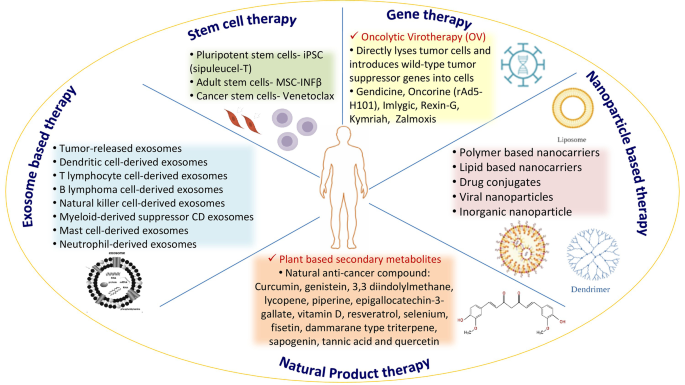Some Known Details About Arogyajivan Medical Tourism For Oncology
Some Known Details About Arogyajivan Medical Tourism For Oncology
Blog Article
Fascination About Arogyajivan Medical Tourism For Oncology
Table of ContentsArogyajivan Medical Tourism For Oncology Fundamentals ExplainedFascination About Arogyajivan Medical Tourism For OncologyArogyajivan Medical Tourism For Oncology - QuestionsThe Ultimate Guide To Arogyajivan Medical Tourism For OncologyArogyajivan Medical Tourism For Oncology for BeginnersThe Best Guide To Arogyajivan Medical Tourism For Oncology3 Easy Facts About Arogyajivan Medical Tourism For Oncology Shown
If you have cancer, your health and wellness care supplier will recommend several means to treat the illness. The most common therapies are surgical treatment, chemotherapy, and radiation. Other options consist of targeted treatment, immunotherapy, laser, hormonal treatment, and others. Below is an overview of the various therapies for cancer and just how they function.Cancer cells expand and separate faster than normal cells in the body. Because radiation is most dangerous to quickly expanding cells, radiation treatment problems cancer cells much more than typical cells. It uses compounds made by the body or in a lab to help the immune system work harder or in a much more targeted means to fight cancer.
Some have toxins or contaminated compounds affixed to them. Immunotherapy is offered by IV. Hormone therapy is utilized to treat cancers cells that are sustained by hormonal agents, such as bust, prostate, and ovarian cancers. It utilizes surgery, or medicines to quit or block the body's all-natural hormonal agents. This aids slow the growth of cancer cells.
The medicines are offered by shot or as tablets. Hyperthermia uses heat to damages and eliminate cancer cells without hurting typical cells. It may be used for: A tiny location of cells, such as a tumorParts of the body, such as an organ or limbThe entire body The heat is supplied from an equipment outside the body or via a needle or probe put in the tumor.Laser therapy utilizes an extremely narrow, concentrated beam to destroy cancer cells. Thin fibers at the end of television guide the light at the cancer cells. Lasers are also made use of on the skin. Lasers are most usually used with various other sorts of cancer cells therapy such as radiation and radiation treatment. In photodynamic therapy, an individual obtains a shot of a medicine that is delicate to a special kind of light.
The Best Guide To Arogyajivan Medical Tourism For Oncology

An oncologist is a cancer cells physician. Marketing on our website helps sustain our mission. A see to an oncologist gives you a chance to talk with a professional that understands what you're going with.
They're all set to aid, and they'll walk with you every action of the way. An oncologist gets included if you have signs that may be cancer.
The Definitive Guide for Arogyajivan Medical Tourism For Oncology
Many cancers are much more treatable in the early phases. Cancer is a complex disease.
Most medical oncologists also concentrate on hematology (the medical diagnosis and therapy of blood conditions and blood cancers). These doctor use radiation therapy to treat cancer. Radiation can diminish growths prior to surgery or kill remaining cancer cells after surgical procedure. You could have radiation as a stand-alone therapy or in mix with other therapies.
More About Arogyajivan Medical Tourism For Oncology
Do I have cancer? The length of time have I had it? What will my life look like currently? If these are the inquiries competing through your mind, you're not alone. Your oncologist is right here to aid you browse these feelings. During your first see, anonymous your oncologist will: Ask you to define your symptoms in detailDo a checkupEvaluation your clinical records, consisting of household background and any past or current health conditionsRun any necessary tests (like imaging examinations or laboratory work) to learn more concerning your symptomsDetermine whether you require a biopsyWhen your oncologist collects the info they require, they'll: Review the outcomes of your testsSend their findings to the doctor who referred youTell you whether you have cancer cells and if so, what kindTalk to you concerning different treatment optionsListen to your problems and anxietiesGive you sources that can supply assistance and added informationYour first oncology see might occupy to 3 hours.
Oncology is the research of cancer. Specialists trained in oncology click here for info offer care for individuals who are at threat for cancer cells, being treated for cancer, and living with cancer cells after treatment.

Getting The Arogyajivan Medical Tourism For Oncology To Work
treat cancer cells in youngsters and teens. Some types of cancer take place frequently in these more youthful age. When these kinds of cancer cells periodically occur in adults, those grown-up clients may select to work with a pediatric oncologist. deal with cancers cells inside the breast area, consisting of the lungs and esophagus. ArogyaJivan Medical Tourism for Oncology. treat cancers in the genitourinary system, such as the bladder, kidneys, penis, prostate gland, and Homepage testicles.

Occasionally when cancer cells is thought but not detected, an oncologist may likewise be involved. Numerous individuals will certainly proceed seeing their oncologist for follow-up visits to check for indications of cancer cells coming back and to manage any kind of side impacts from treatment.
Arogyajivan Medical Tourism For Oncology for Beginners
If you have a cancer medical diagnosis and are evaluating your therapy options, consider getting involved in a scientific trial. Although they may appear daunting initially, clinical tests can be very beneficial no matter what type or phase of cancer cells you have. Benjamin Levy, M.D., medical supervisor of the Johns Hopkins Kimmel Cancer Center at Sibley Memorial Hospital and a lung cancer scientist, explains a few of the reasons to sign up with a scientific test.
Report this page